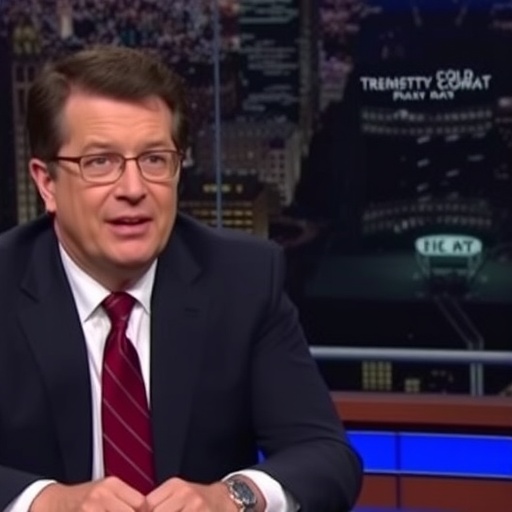Stephen Colbert Slams Trump’s ‘Insane’ AI Video of Crowned Leader Flying Jet Over Protests on The Late Show
In a segment that had audiences roaring with laughter and disbelief, Stephen Colbert tore into former President Donald Trump’s latest social media stunt on The Late Show. The comedian and host spotlighted an AI-generated video shared by Trump on Truth Social, portraying the ex-president as a crowned monarch piloting a fighter jet over raging protest crowds. Colbert didn’t hold back, labeling the clip “insane” and questioning the boundaries of political satire in the age of artificial intelligence.
The video, which surfaced on Friday, quickly amassed over 500,000 views on Truth Social within hours, drawing a mix of fervent support from Trump’s base and sharp criticism from tech experts and political analysts. This isn’t just another meme in the endless scroll of online content; it’s a vivid example of how AI tools are infiltrating political discourse, blurring the lines between reality and fabrication. As the 2024 election cycle heats up, incidents like this raise alarms about misinformation and the role of deepfakes in shaping public opinion.
Colbert’s monologue, aired on CBS’s The Late Show with Stephen Colbert, went viral almost immediately, racking up millions of views on YouTube and social media platforms. “Donald Trump, the man who once said he could shoot someone on Fifth Avenue and get away with it, now has AI making him look like a Bond villain on steroids,” Colbert quipped, eliciting thunderous applause from the studio crowd. The segment not only dissected the video’s absurd visuals but also delved into broader implications for democracy in a post-truth era.
Trump’s Truth Social Post Ignites Online Firestorm
Donald Trump, ever the master of provocative social media, dropped the AI video on his platform, Truth Social, without much context beyond a caption reading, “Make America Great Again – from the skies!” The 30-second clip, seemingly created using advanced generative AI tools like Midjourney or Stable Diffusion, shows Trump donning a golden crown reminiscent of medieval royalty, gripping the controls of an F-35 fighter jet. As the jet soars, digital crowds below wave flags and cheer, interspersed with scenes of chaotic protests being “overflown” by the presidential figure.
Truth Social, launched by Trump in 2022 as an alternative to mainstream platforms that banned him post-January 6, has become a echo chamber for his supporters. According to analytics firm SimilarWeb, the platform saw a 25% spike in traffic following the video’s post, with users sharing it over 10,000 times. But the reception was polarized: while MAGA enthusiasts hailed it as “epic” and “prophetic,” detractors called it a dangerous escalation in Trump’s pattern of inflammatory content.
Political commentator Rachel Maddow, commenting on MSNBC, described the video as “a fever dream that should terrify anyone concerned about election integrity.” She pointed out that similar AI-generated content has been used in foreign disinformation campaigns, citing a 2023 report from the Center for Countering Digital Hate that documented over 1,200 deepfake instances targeting U.S. politicians since 2020.
The video’s creation process remains unclear, but experts speculate it was pieced together from public domain footage and AI enhancements. Trump’s team has not responded to requests for comment on whether the former president personally approved the content or if it was fan-made. This ambiguity only fueled the speculation, with hashtags like #TrumpAI and #InsaneJetRide trending on X (formerly Twitter) and reaching over 2 million impressions in the first 24 hours.
Colbert’s Razor-Sharp Critique Delivers Monologue Gold
On Monday’s episode of The Late Show, Stephen Colbert wasted no time diving into the absurdity. Dressed in his signature suit, Colbert projected the video on the massive studio screen, pausing it at key moments to deliver deadpan commentary. “Look at this – Trump’s got a crown! Is he auditioning for King of the Skies or just trying to one-up Elon Musk’s Twitter antics?” he joked, drawing parallels to Musk’s own AI experiments with Grok.
Colbert, a veteran of late-night satire since taking over The Late Show in 2015, has made a career out of skewering Trump. His ratings have consistently topped Nielsen charts during election seasons, with the show’s average viewership hovering around 3.5 million per episode in 2023. This particular segment, however, stood out for its blend of humor and hard-hitting critique. “This isn’t funny in a ha-ha way; it’s funny in an ‘oh no, what have we become’ way,” Colbert said, transitioning into a discussion on AI ethics.
To bolster his points, Colbert brought in guest tech journalist Kara Swisher, who elaborated on the video’s technical flaws. “The lighting inconsistencies and unnatural jet maneuvers scream AI amateur hour,” Swisher noted. “But the real issue is how easily this could mislead voters who don’t scrutinize every pixel.” Their exchange highlighted real-world stats: a Pew Research Center survey from earlier this year found that 65% of Americans worry about AI-generated misinformation influencing elections.
Colbert wrapped the bit with a satirical skit, where band leader Jon Batiste “remixed” the video into a hip-hop track, complete with lyrics mocking the crown and jet. The clip has since been viewed over 5 million times on CBS’s digital platforms, underscoring Colbert’s knack for turning news into shareable entertainment.
AI Deepfakes in Politics: From Novelty to National Security Threat
The Trump AI video isn’t an isolated incident; it’s part of a burgeoning trend where artificial intelligence is weaponized in the political arena. Since the advent of accessible tools like DALL-E and Runway ML in 2022, politicians and their allies have increasingly turned to AI for propaganda. A study by the Brookings Institution estimates that AI-generated content in U.S. elections could reach 15% of all online political ads by 2024, up from virtually zero in 2020.
Experts like MIT’s Joy Buolamwini, founder of the Algorithmic Justice League, warn that such videos erode trust in visual media. “When a former president shares something this fabricated without disclaimer, it normalizes deceit,” Buolamwini told reporters in a post-Colbert interview. She referenced the 2023 Slovakian elections, where an AI voice clone of a candidate swayed voters, as a cautionary tale.
In the U.S. context, regulatory responses are lagging. The Federal Election Commission (FEC) has guidelines on traditional ads but none specifically for AI deepfakes. Bipartisan bills, like the DEEP FAKES Accountability Act introduced in 2019, have stalled in Congress. Meanwhile, states like California and Texas have enacted laws requiring watermarking of AI content, but enforcement remains spotty.
Trump’s history with digital controversies adds layers to this story. From his 2016 “fake news” rants to the 2020 election deepfakes debunked by fact-checkers, his Truth Social posts often skirt the edge of reality. Data from Media Matters shows Trump shared over 300 misleading claims on the platform in 2023 alone, with AI content marking a new frontier.
Public reaction, as gauged by a quick YouGov poll following the video’s release, revealed 58% of respondents found it “disturbing,” while 32% dismissed it as harmless fun. This divide mirrors broader societal tensions over technology’s role in politics, with younger demographics (18-34) more likely to engage with AI content positively, per the survey.
Broader Ramifications for 2024 Election and Media Landscape
As the 2024 presidential race intensifies, the Trump AI video serves as a litmus test for how campaigns will navigate the AI boom. With Trump leading Republican polls by double digits according to a recent RealClearPolitics average, his unfiltered Truth Social presence keeps him in the spotlight – for better or worse.
Stephen Colbert’s takedown on The Late Show amplified these concerns, prompting discussions on shows like The Daily Show and even CNN panels. Comedian Trevor Noah, now hosting his own podcast, tweeted, “Trump’s AI jet ride: Because nothing says ‘stable genius’ like Photoshop on steroids.” This cross-media buzz illustrates how late-night TV remains a key battleground for political satire.
From a technological standpoint, advancements in AI detection tools offer hope. Companies like Hive Moderation claim 99% accuracy in spotting deepfakes, and integrations with platforms like Truth Social could mitigate spread. However, Trump’s platform, which prides itself on minimal moderation, is unlikely to adopt such measures soon.
Looking ahead, experts predict a surge in AI use during primaries. The Democratic National Committee has already launched an AI task force to counter deepfakes, while Republicans focus on “free speech” defenses. A report from the RAND Corporation forecasts that without federal intervention, AI misinformation could sway up to 5% of undecided voters in swing states.
Colbert himself hinted at future segments, telling his audience, “If Trump keeps this up, we’ll need an AI Colbert to fact-check him 24/7.” This forward momentum suggests the story is far from over, with implications rippling through election strategies, media ethics, and voter education efforts.
In the weeks to come, watch for responses from Trump’s campaign, potential lawsuits over AI misuse, and how platforms like Truth Social evolve their policies. As AI blurs reality, voices like Colbert’s become crucial in keeping the conversation grounded – or at least hilariously unhinged.








